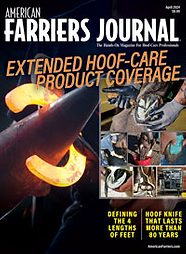Impending winter weather and loss of pasture access make all owners of thin senior horses anxious. There are things to consider when a horse is underweight that span all age groups, but seniors have additional considerations.
Older horses need frequent, but not necessarily aggressive, dental care. Problems such as worn teeth, loose or missing teeth, abscesses and gum irritation from food packing into diastemas (gaps at the gum level) are common older horse issues that interfere with effective chewing and/or cause pain. Wear also changes the angle of the chewing surface, which reduces the effectiveness of chewing.
The goal of dentistry should be to remove pain, not necessarily “fix” things. Horses with significant dental issues reap the most benefit from a wet, if not soupy, diet. Hay cubes or pellets can be thoroughly soaked, as can complete feeds, beet pulp and bran. Get professional advice in formulating the diet.
I commonly recommend incorporating psyllium into these wet senior diets. It further increases how easily they are swallowed, as choking is a concern with seniors, and is an excellent prebiotic. Use 1 to 2 oz. of psyllium husk fiber per meal.
Older horses often have reduced natural immunity to parasite infections and may even become positive for parasites normally only seen in foals, like roundworms. This is one cause of weight loss you can control. Keep an eye on fecal egg counts and work with your vet on developing an individual deworming program for your senior.
Supplementing fat, up to 0.5 kg per day, considerably increases the caloric density of the diet. Begin with a flax-based supplement to replace omega-3 fatty acids if the horse is not on fresh grass. Use at least 0.12 kg per day of this or even up to the full 0.5 kg per day. If feeding less than the full 0.5 kg per day of flax based supplement, I recommend making up the difference with something that will not upset the omega-3:omega-6 ratio.
Senior citizens of all species may suffer from reduced digestive efficiency. The diversity and amount of microflora in the large intestine of the horse decreases with age. A supplement with both high digestive enzyme activity and good numbers of live probiotic organisms can be very helpful for seniors.
Vanishing toplines is a common complaint with older horses. When this is seen, the horse should always be checked for PPID (pituitary pars intermedia dysfunction, aka Cushing’s Disease), because high cortisol activity in these horses causes muscle loss. There may also be a factor of poor protein digestibility and/or inadequate key amino acid intake. Supplementation with the triple combination of L-lysine, DL-methionine and L-threonine is an inexpensive safeguard on the nutritional end.
Problems such as heart failure, kidney failure, liver disease or malignancies are rare in younger horses but anything goes with a senior. All of these may have weight loss as a component. It’s always wise to involve your veterinarian when having weight issues with a senior. Odds are one or more of the factors mentioned earlier will be the explanation, but keeping your vet informed of the issue and what was tried will save precious time in deciding on diagnostics and treatment down the road.







Post a comment
Report Abusive Comment